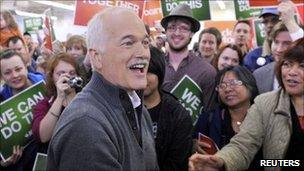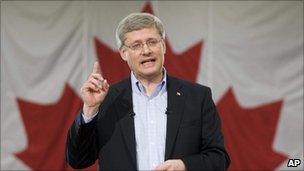Canada's NDP closes on Conservatives ahead of election
- Published
The Conservatives and Liberals have been given a shock by the swell in support for the NDP
Canada's 2 May general election may trigger a political earthquake: Prime Minister Stephen Harper's Conservatives could be thrown out by a left-wing party that once trailed in the polls, reports the BBC's Andrew North from Toronto.
"You're from the BBC? You mean the BBC?" the Canadian voters we met typically asked.
"Yes, the BBC," I said.
"So what are you doing here? You should be covering the royal wedding."
Hardly a vote of confidence in the importance of their own elections.
True, Canada's third elections in only five years were always going to struggle for attention, even if Prince William and his bride had not been walking down the aisle.
It is just possible, though, that Canada is on the verge of a political earthquake.
'Growing rebellion'
With just days to go, opinion polls suggest the left-wing New Democratic Party (NDP), previously languishing among voters, has surged into a close second behind the incumbent Conservatives, led by sitting Prime Minister Stephen Harper.
Instead of the majority he was hoping for, he is struggling to hold off what looks like a growing rebellion against Canada's political mainstream.
Gains by the NDP could also push the other main party, the Liberals, to the margins.
"This is the strangest election I've seen in more than 40 years," says veteran political journalist and broadcaster Dennis Trudeau.
If Monday's results match the opinion polls, the NDP and its charismatic leader Jack Layton, who have never held power before, could even form a minority government and reverse Canada's rightwards, pro-US drift.
Out on the stump in the constituency of Brampton-Springdale, one of the key battlegrounds, one could feel the change in mood.
"I'm voting for this guy," says one elderly man, pointing to a campaign leaflet picture of the NDP leader, as the party's local candidate Manjit Grewal went door to door.
With disgust in his voice, he admits that he voted for the Conservative Party in the last election.
"They're only for the rich people, the Conservatives and Liberals," says Hazel Crawford, explaining why she intends to vote for the NDP.
Mr Grewal, a local taxi driver and first-time candidate, acknowledges his surprise at the response he has been getting.
Coming from behind
The NDP came in a distant third here in the last election, in 2008.

Opinion polls suggest NDP Jack Layton has gained increasing support in recent days
At the local Conservative campaign office in the city of Brampton, in Ontario, the party's supporters were trying to look upbeat.
Conservative Parm Gill lost to the Liberals by only 700 votes in the last election.
The party has brought a large amount of resources to Brampton, taking over a whole floor of a large office block and filling it with computers, phones and scores of election workers,all overseen by a senior campaign expert parachuted in from the party headquarters in Ottawa.
Campaign leaflets have been printed in different languages to target the area's large minority populations.
If the Conservatives can win places like Brampton-Springdale, a suburb of Toronto, Canada's largest city, they could be on course for a majority. But after the NDP surge, the result here is hard to predict.
The Liberal Party here seems even more nervous - no-one would even talk to us.
Unexpected race
No-one saw this coming.
Many Canadians viewed this election as a straight race between the Conservatives and the Liberal Party, which is led by former academic and journalist Michael Ignatieff.

Prime Minister Stephen Harper has criticised the NDP as being too inexperienced to lead Canada
Together the two parties have dominated Canada's political scene.
Despite the Conservatives facing accusations of sleaze, Mr Harper was banking on his economic record to secure him a third term.
This time he hoped to be able to win outright, without needing the ad hoc support of other parties to pass legislation, as he has done since 2006.
But both Mr Harper and Mr Ignatieff have failed to connect with voters.
Analysts have said Mr Layton is seen as having the common touch, the kind of guy Canadians would want to have a beer with.
While it has been cast as left-wing, many also seem to like the NDP's mix of policies, which draw from both sides of the political divide.
For instance, it takes the same position as the Conservatives on Canada's budget, promising to balance it within four years.
Critics, though, have said its plans do not add up.
An NDP minority government would probably mean less support for the US, and a re-balancing of Canada's approach to the Middle East, say analysts.
When we caught up with Prime Minister Harper at a rally near Canada's landmark Niagara Falls, it was clear how seriously the Conservatives are taking the NDP threat.
Much of the rally was spent attacking the the New Democratic Party's plans.
But these are just opinion polls. This sudden surge of support could melt away into the secrecy of the ballot box.
It could help the Conservatives hang on to power by dividing the centre and left-wing vote.
But political observer Dennis Trudeau says: "All bets are off."
So keep a close eye on the elections this Monday. Canada could be about to enter uncharted political territory.
- Published30 April 2011
- Published21 April 2011
- Published29 April 2011
- Published29 April 2011
- Published13 April 2011
- Published28 April 2011
- Published22 April 2011